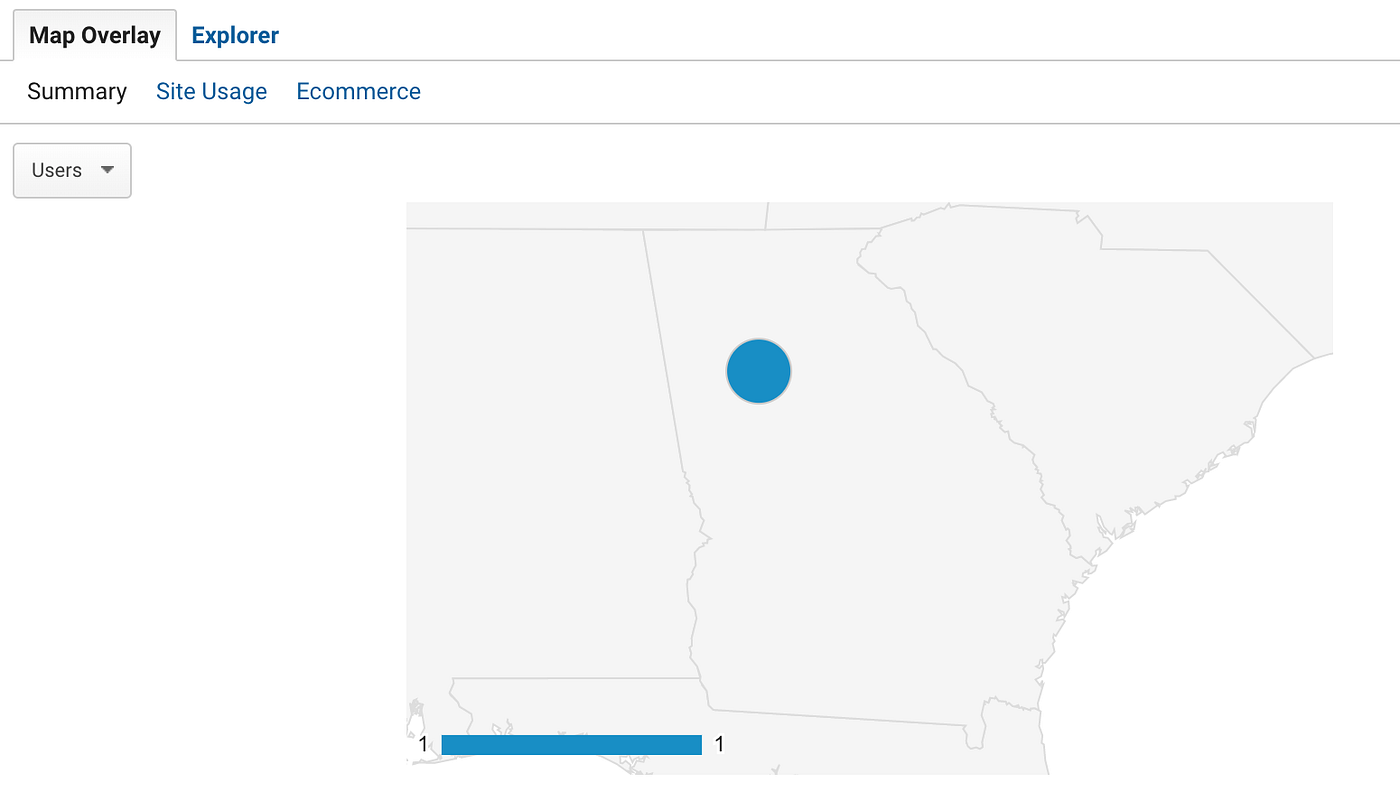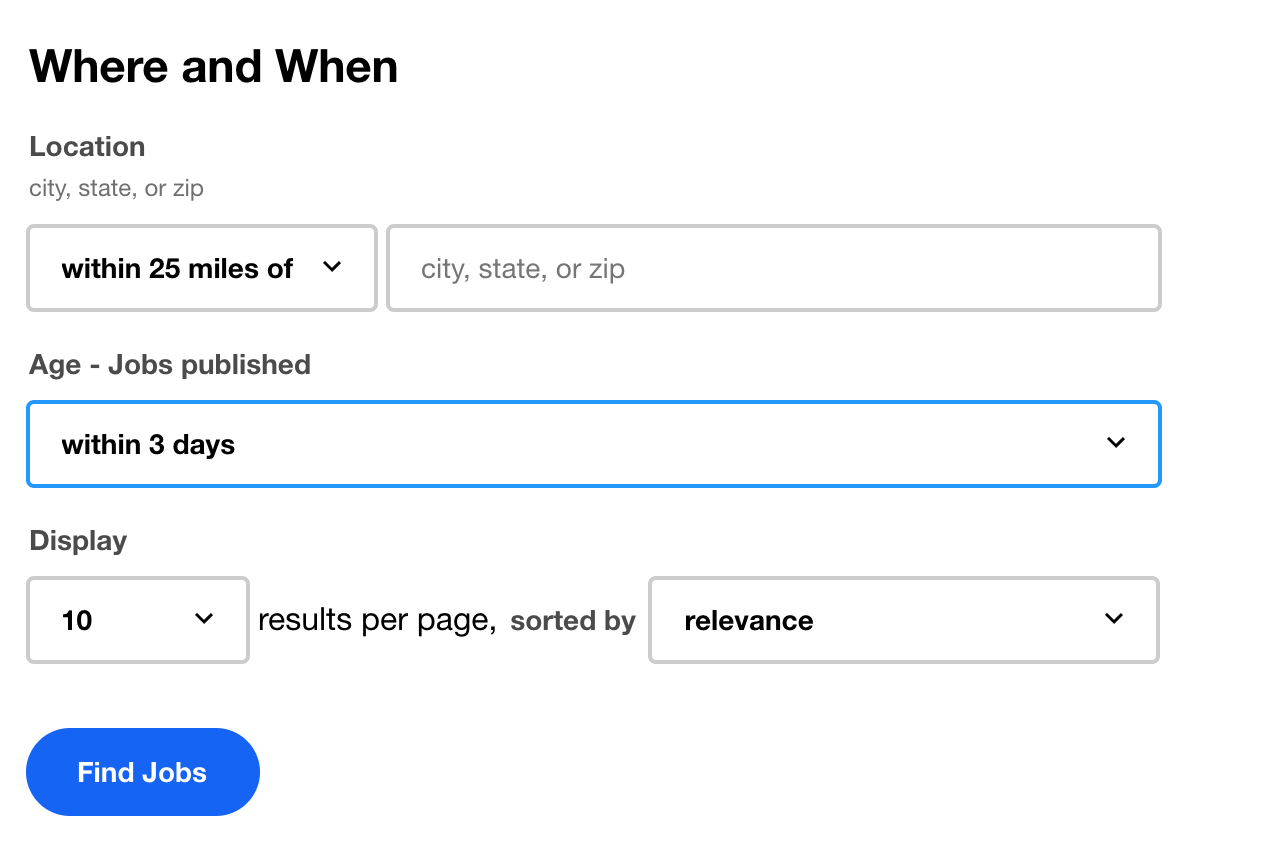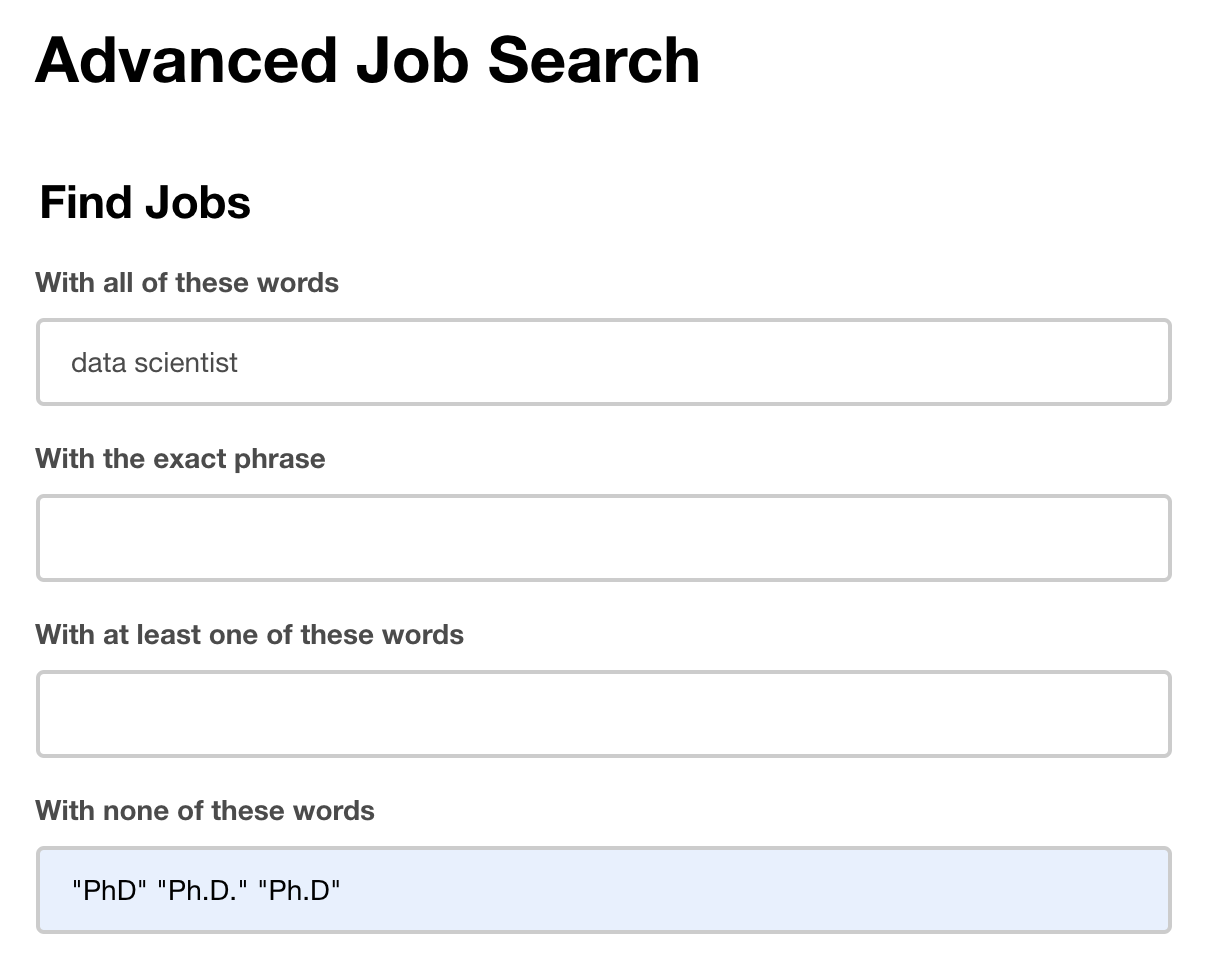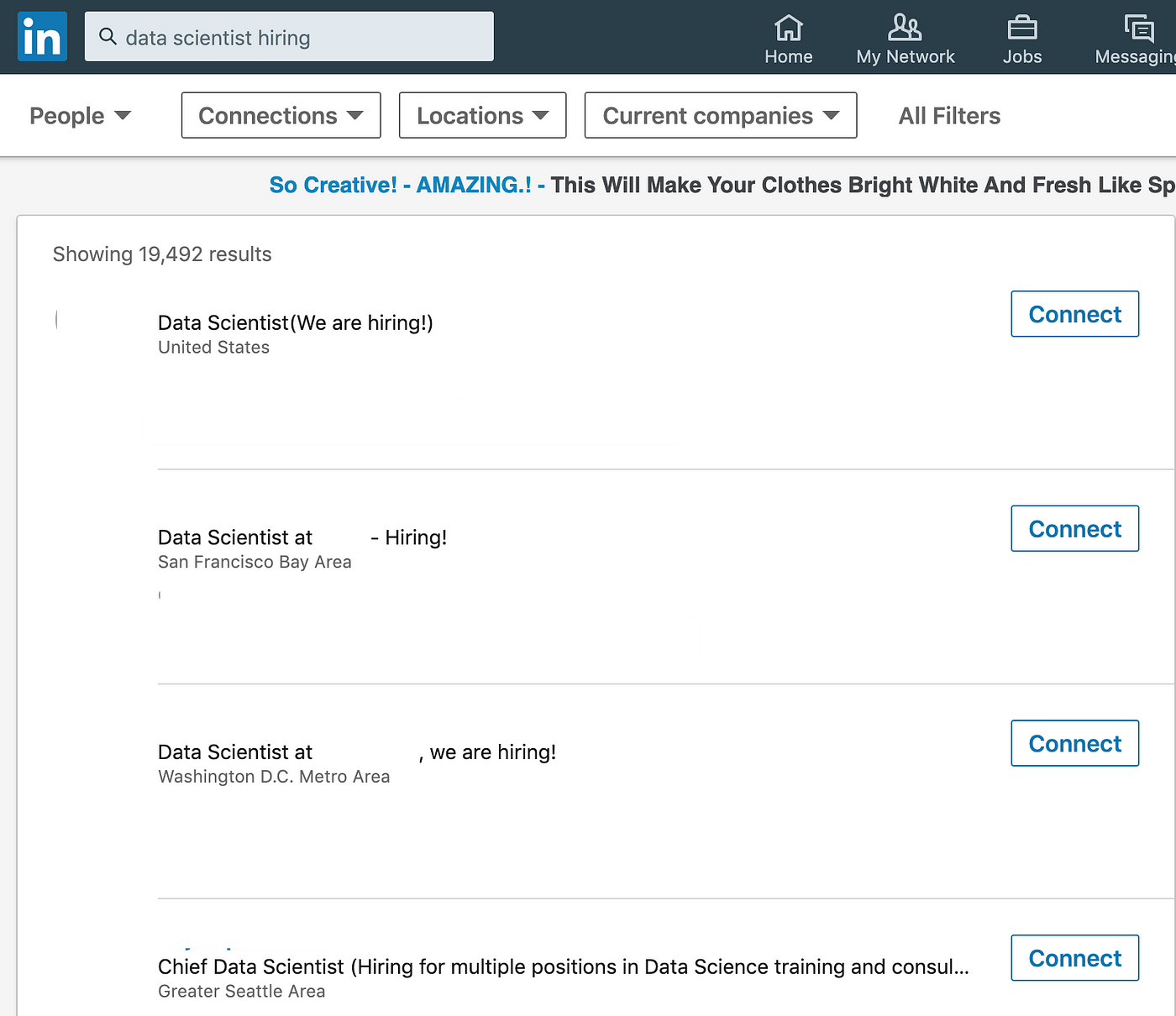How To Get An Entry Level Data Science Job
How to Get Hired as an Entry Level Data Scientist When You Don't Already Take 3 Years Experience and a PhD
As a new and complicated field, recruiters understandably have a difficult time telling who is and isn't a qualified data scientist. As a result, you may exist seeing job applications with incredible requirements, e.g. PhD in Data Scientific discipline and 3 years experience. If the best way to go recruited as a information scientist is to already exist one, how are you ever going to go a data science job? Here are my specific recommendations on getting information science jobs. Some are easy to implement, some are hard, but I promise they are all worth it.
Have a website
A data science position is a tech position. As someone in tech, having a website adds legitimacy to your status as a tech person. I'd recommend doing it "yourself" and not using a basic editor like Wix or Squarespace. Personally, I used blogdown with R to make my website fairly speedily. This is my number one tip since in near every interview I've had the interviewer mentioned how nice my website is. I take also had a few instances where a recruiter reached out to me considering of my website.
I've added Google Analytics to my website. This lets me know when someone from a specific geographic area views my site. If I utilise for one and only one job in Atlanta, having a website view from Atlanta gives me an indication that someone is looking at my website from that company. These days about companies don't fifty-fifty email you a rejection, so having a view of your website might exist more of a bespeak than you would normally go.

Yous should also get a custom domain name. Besides looking a little chip better on your resume, this enables you to have an email that would await like yourname@yourname.com, which is kinda neat.
A website besides serves as a place for you to display some personal projects y'all've been working on which brings me to my adjacent tip.
Have a portfolio
Recruiters don't necessarily know a lot about information science. A portfolio is the best style to prove to them you practice. Having a listing of projects on your resume is nice. Even ameliorate is to have URLs that the recruiter can click on to view online. Ideally, your projects have an interactive element to them (e.g. does object detection of images the recruiter uploads, or does some NLP on their social media). Making your projects interesting can exist a large deal, which I covered in the recent article "Your Personal Data Science Projects Are Slow. Let'due south Change That." I'd recommend having at least three projects, my portfolio has only a few but I still get occasionally positive comments near it.
Here are a few things you should check out to quickly make an online project:
- Rpubs
- Shiny
- nbviewer
- Tableau Public
- Flask/Django
- YouTube Tutorials
Go skilful at core data science skills
The cadre data science skills are python (including numpy, pandas, and sklearn) and SQL. I would recommend watching so many tutorials until you're admittedly sick of information technology, producing your own tutorials is also a expert idea.
A fair number of the technical interviews I have had are basic python or numpy questions (e.yard. find the second biggest value in an array, notice frequency of digits in an array, find a missing element from ordered sequence). Doing leetcode and having a good understanding of Big O Notation and data structures should prepare you more than amply for most information scientific discipline interviews.
Have a niche within data science
In my stance, you should have a technical and non-technical niche inside data scientific discipline. Here are a few technical niches within data scientific discipline (don't pick python or SQL, those are your core skills):
- R
- MongoDB
- BI Tools
- Computer Vision
- NLP
- Time-Series
- Spark
- TensorFlow
Just it is also important to develop a non-technical niche this can be things like:
- Finance
- Sports
- Visualization
- Manufacturing
Basically, I call up information technology is important to get good with a tool or process that isn't Python/SQL and accept an area of expertise. Being an expert in a sub-domain of information science makes you more probable to go a chore in that area. I believe that in that location volition be fewer and fewer data scientific discipline "generalist" jobs over the adjacent few years and you lot'll be seeing more than and more requests for specific tools and cognition.
Some other ideas I have related to this are to:
- Start a club/MeetUp for your niche
- Contribute to open-source projects for it
- Do Kaggle competitions well-nigh covering niche
- Create tutorials specific to your niche
Either rewrite your resume or accept two copies of it
These days your resume is likely going to be read by a estimator. Though there are many people talking virtually how AI is revolutionizing hiring, most of the programs written to parse your resume aren't that practiced. You may have thought "I should make a beautiful resume to stand out" but actually you should exist thinking "I should brand a elementary resume then a computer tin can read it." Resumes with plots, tables, or interesting layouts really hinder y'all.
Your resume will be going through something called the Applicant Tracking Arrangement. I found a complimentary site here to test how well your resume does with ATS. Edit it until it passes hands, and check out multiple ATS testers.
You may just want ii copies of your resume, one that goes through ATS, and one that looks great and yous can give to someone in person.
Using Indeed's Advanced Search
The average time information technology takes for a recruiter to receive the first applicant for a position: 200 seconds, co-ordinate to J.T. O'Donnell. Well-nigh jobs will accept 200 applicants. From what I tin can meet on LinkedIn, for data science it's even more than than that.
If you want your resume to really go viewed, you don't stand a hazard if y'all're applying for jobs with an old posting date. My recommendation is using Indeed'due south avant-garde search and limiting jobs to "within 3 days." Don't panic if this removes a lot of jobs, new ones are posted all the time.

Next, I'd recommend eliminating job postings that ask for a lot of feel, you tin can do this with Indeed likewise. These jobs either do crave lots of experience and you're not qualified for the position, or they don't require a lot of experience just the recruiter asked for a lot because they don't know much about data science and thought information technology was okay to ask for something similar "7 years feel with TensorFlow" even though information technology has only been around for 4 years. Either way, not a job you should apply for. Here'due south my proffer on eliminating those jobs:

Ph.D. is the best way to eliminate jobs that aren't for you. Y'all tin can too effort adding in the word "Inferior", "Jr.", or "Entry level" if you're applying for your get-go chore. Also you tin add in your niche to the "at least one of these words" section to discover jobs you lot're peculiarly qualified for. This is honestly one of my top tips for applying for jobs, luckily it'due south easy to implement. Don't get discouraged if there are only a few jobs that are there later on you make these filters, new jobs are posted all the time.
Your LinkedIn Contour
Filling out your LinkedIn Contour is a good idea. Hither are my all-time tips for that
- Your past job descriptions should exist at to the lowest degree ii paragraphs long. Make sure to apply keywords for the jobs you may want e.chiliad. if you lot desire to work in computer vision, reference computer vision skills in your description. When I redid my job descriptions, LinkedIn began displaying dissimilar jobs to me.
- Add together to your skills department of your LinkedIn profile. A lot of people forget that this exists, but it plays a paw in showing yous jobs you may desire to apply for.
- Accept advantage of LinkedIn Learning, if yous're a current university educatee at that place is skilful hazard you get this or Lynda.com for complimentary. Taking these courses greatly added to my understanding of topics and skills, simply a nice reward is that you can directly add the course certificate to your profile.
- I recommend including a embrace photo for your profile and not having the default one, information technology shows you care about your LinkedIn. Finally, make sure you actually accept a profile motion-picture show and it is taken on a neutral background.
Reaching out to people on LinkedIn
Generally, I don't retrieve LinkedIn is a great place to employ for jobs, but reaching out to people direct tin assistance you a lot. Try typing "data scientist hiring" and searching in people instead of jobs. Many people will have this in their bio. These people are generally okay with having people achieve out to them about opportunities. When y'all brand your ask, be cursory, have a compelling reason you are interested in their company, take a specific job you're applying for, include your resume, and I'd recommend including a link to your website. If you don't include all of these, you're likely going to get ignored. I don't recommend trying information technology on people who don't betoken they are hiring in their bio. I tested it below and blocked out people's pictures, companies, and names, but you tin can come across their bios are exactly what you're looking for.

Skills that impress developers
You're going to have to work with developers, you lot may even exist interviewed past some over the form of the interview procedure at many companies. To make these people call back that you lot're crawly to work with, invest in the skills that makes you nice to piece of work with. These include git, flask, docker, using an API, and deploying models to the deject. Jeremie Harris covered this ameliorate than I could in this blog post.
Edifice "your brand"
Making a proper noun for yourself is useful as it may generate people trying to rent you, without you even applying for jobs. Hither are a few things yous tin can practice to build your make, some I have already mentioned. It's useful to practice some of these things even if you have a job, since yous'll never know when you'll exist searching for another.
- Brand a website (it should include a blog department)
- Have a professional twitter account and interact with people yous respect, I've actually learned a lot more from twitter than LinkedIn
- Build tutorials on YouTube (especially if they are on an emerging skill)
- Write something on Medium
- Attend conferences
- Compete (or mentor if you're too onetime) at hackathons
- Do volunteer data science piece of work for non-profits
- Start a MeetUp or social club
How To Get An Entry Level Data Science Job,
Source: https://towardsdatascience.com/how-to-get-hired-as-an-entry-level-data-scientist-when-you-dont-already-have-3-years-experience-476394f2cc2c
Posted by: bootheequirt1951.blogspot.com


0 Response to "How To Get An Entry Level Data Science Job"
Post a Comment